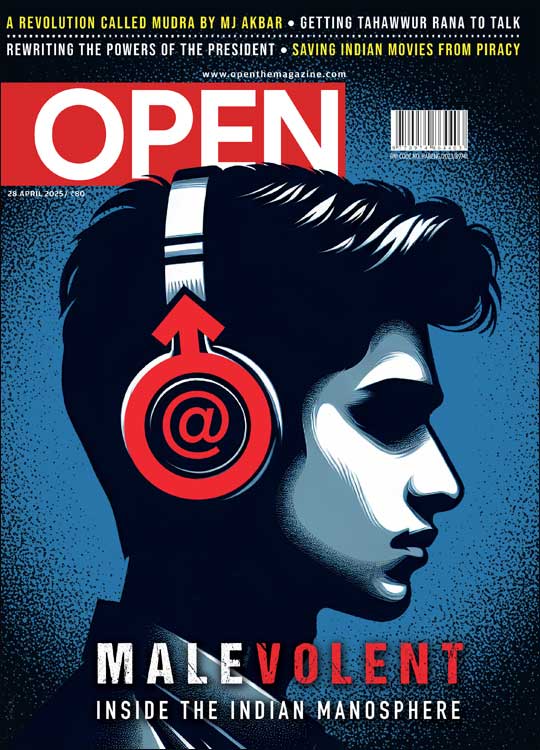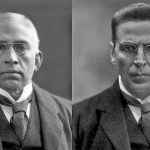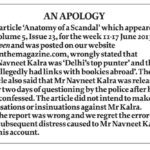The Survivors
The lives of Aarushi Talwar’s family and friends
 Mihir Srivastava
Mihir Srivastava
 Mihir Srivastava
|
25 Oct, 2012
Mihir Srivastava
|
25 Oct, 2012
/wp-content/uploads/2015/11/Cvr-Talwar-2.jpg)
The lives of Aarushi Talwar’s family and friends
Few murder cases have captivated the country as much as the twin killings of 13-year-old Aarushi Talwar and 45-year-old Hemraj on 16 May 2008. What exactly happened that morning between 12 am and 6 am inside L-32 Jalvayu Vihar in Noida, where the bodies were found, is a mystery. Of the four people who lived in the flat, which had no sign of a break-in, two were done to death: the teenaged girl and the domestic help. The other two, Aarushi’s parents Rajesh and Nupur Talwar, claim they slept through it all. While there has been plenty of speculation in the media and elsewhere, no motive for the crimes has come to light.
The case is under trial in a special CBI court in Ghazia- bad with the parents as prime accused. Having spent time in jail, the Talwars are now out on bail, fighting to prove their innocence. This is a report on their lives, not on the case.
I have followed the case closely. In January 2011, I wrote a report for India Today titled ‘The Untold Story’ that hinted at the possible role of ‘insiders’ in the murders. It was based primarily on circumstantial evidence found by investigation agencies. The same week, Open carried an extract from Patrick French’s book India: A Portrait that seemed largely sympathetic to the parents, who appeared to shift suspicion to Krishna, Raj Kumar and Vijay Mandal, the three domestic helps who were the CBI’s early suspects. Later, in May 2012, I wrote another story ‘The Aarushi Case Files’ , this time for Open, listing a set of unanswered questions that drew attention to the possibility of the scene-of-the-crime having been dressed up—presumably by the murderer/s.
Given my past coverage of the case, I was surprised to be approached—this was a couple of days after Nupur’s 26 September release on bail—by a friend of the Talwars to brief me about the family’s version of the story. The motivation perhaps was to offer me a perspective they felt I had missed. I had a two-hour long discussion with Dinesh Talwar, Rajesh’s elder brother, who sought to convince me that Aarushi’s parents had been a victim of a CBI plot. After that, I had a series of meetings with relatives and friends of the Talwars—held mostly in the South Delhi residence of Rajesh’s elder brother Dinesh Talwar. This circle of friends and relatives revealed how nightmarish the last four years have been for all of them. They believe that India’s premier investigative agency, the Central Bureau of Investigation, is out to persecute as much as prosecute them. At first, the CBI, after its first round of investigations, had sought to implicate the trio of Krishna, Raj Kumar and Vijay Mandal. But with no evidence to go on, in 2010, the agency asked for a closure of the case. It was the Talwars who protested this move, and demanded that the mystery be solved and justice be done. The court granted their request. The case was reopened for trial. But to their shock, they found themselves named as the prime accused.
The Talwars’ family and friends feel the CBI has no evidence against the parents and is using insinuations as a prosecution tool. They feel their right to being presumed innocent until proven otherwise has been violated.
I had a brief meeting with the couple on 7 October, and they wanted their words kept off the record since the case is under trial. It has been a harrowing time for the parents of Aarushi. They have suffered public vilification, physical assault and imprisonment. Life-sized portraits of Aarushi adorn the walls of their living room. It is hardly solace enough. With no end in sight to their troubles, the Talwars come across as miserable and helpless. But they will not give up, they say.
THE FAMILY
Rajesh and Nupur got married in 1989 after they met in Delhi’s Maulana Azad Medical College. The younger son of cardio-surgeon JL Talwar, the groom was Punjabi, and the bride, daughter of Air Force officer Balchandra Chitnis, Maharashtrian.
The couple started a dental practice. Aarushi was born on 24 May 1994. She was their only child. After her death, Rajesh and Nupur shifted to Nupur’s parents’ house in the same neighbourhood as their home. Then they moved in with Dinesh (who is 51, three years older than Rajesh) and his wife Vandana, and stayed there for nine months before shifting to a flat they brought in the same building.
Dinesh’s apartment, bought in 1983 by the brothers’ father, has recently been refurbished. The drawing room, with glass doors and white walls, has an off-white carpet and light furniture in blue upholstery that matches the curtains. There is crystalware on glasstop tables. Dinesh and Vandana are medical practitioners; he is an eye-specialist and she, an anaesthesiologist.
They want Rajesh and Nupur cleared of all charges. “This case is a mission for the family,” says Vandana, “For Dinesh, the case is first priority, and then comes the profession and family.” It is not just emotional support, it is much more. There is running around to do and legal issues to work through, all of it exhausting and stressful. “There is no going back,” she says, “If I had any doubt [Rajesh and Nupur] had done it, I would have never been with them. What is wrong is wrong. We know that they have not done it, we cannot not be with them.”
Vandana too was earlier preoccupied with the case, but says she must fill in for her husband by spending more time with their two children, if only to reclaim their family life. Their son Akshey, 22, and daughter Shreya, who is 18 (and was born six months before Aarushi), have been silent witnesses to the turmoil their cousin’s death has thrown the family into. For many years, the whole family slept together in one room. Says Vandana, “It has been only a few months that Shreya has started to sleep in her own room.” Dinesh still wakes up at night in a cold sweat to see if his family is safe.
It was particularly hard on Shreya, who was very close to Aarushi. In the past few years, she has sat for hours holding her uncle and aunt’s hands, being Aarushi for them as it were. “We would talk about many things, including Aarushi.” It has been very difficult for her, trying to come to terms with the tragedy. “The fact that Aarushi is no more has not sunk in yet,” Shreya says, “I have stopped celebrating my birthdays. I can’t imagine a birthday party without Aarushi.” But life, they know, must go on. Shreya’s mother encourages her to go out and meet friends. She has recently joined a college in Delhi, though she is haunted by fears of other students talking about the case. There is no respite from it.
Akshey is a content writer for various websites, a workcoholic who is perpetually hooked to his iPad or issuing instructions over his mobile phone. He sits silently through the meeting. Asked of his family’s response to all that’s happened, he retorts with a single word—“anger ”.
At the end of the day, it is Rajesh and Nupur who have to deal with the loss. And stand trial on charges of filicide. “A grave injustice is being done to them,” says Vandana, “It is frustrating because you can’t do anything about it.”
The Talwars didn’t speak to the media earlier, she says, because they had been advised to lie low—first by the police and later by their lawyers. It was a bad idea, the family now believes, for it left the field open for stories planted against them by the CBI and others. Yet, the parents must watch every word they utter, aware that anything they do or say in public could be used against them in court. Media coverage has caused them enough grief already.
“Imagine what Rajesh and Nupur have to go through,” says Dinesh, “They were learning to live their life without Aarushi, had resumed their practice and started meeting a select few friends. They cooperated with the police and then the CBI in all possible ways. In fact, we suggested that touch DNA tests be done to ascertain conclusively who the killers could be.” The Talwars even offered to pay for the tests, but cannot understand why the CBI never got these done. [Lalji Singh, founder director of Hyderabad’s Centre for Cellular and Molecular Biology, and a touch DNA expert, has stated that the CBI did approach the lab for this test, but he refused since the scene-of-the-crime had been tampered with and samples contaminated. “It was too late for any conclusive result,” Singh told The Times of India in February last year.]
The Talwars, Dinesh says, were “shell shocked” to find themselves as prime suspects. “They were numbed by the shock. They are bewildered. They do not know why this is happening to them. It was difficult to see them in that state. The CBI report does not have a single piece of conclusive evidence against the two, it is just full of insinuations. It’s like being hurt at the same place again and again. The pain has only intensified…” “Justice is a far cry,” Vandana intervenes to say, “At present, they are fighting to ensure injustice doesn’t happen to them.”
“Can you understand the trauma of a man who is accused of killing his only daughter and his wife is sent to jail?” asks Dinesh. “Trauma has brought them closer. It is a phase of darkness that will someday be dispelled with light.” They are thankful for the help they have got from beyond their circle of friends and family. Dinesh mentions lawyers like Harish Salve and Mukul Rohatgi, among others. “We went to them and they decided to help us. They have not charged us. We cannot afford them. There is a lot of goodness in this world,” says Dinesh.
For Rajesh, it has been a struggle just to retain his sanity. Much of the brothers’ time is spent with lawyers and on paperwork for the trial. “We are self-employed. We don’t have the resources to hire help,” says Dinesh, a doctor who has almost no time to spare, shuttling between hospitals and the court, “We have to do all the work ourselves. The trials are going on in Ghaziabad. It is not easy to coordinate with lawyers in Delhi and Ghaziabad.”
THE GRANDPARENTS
Balchandra Chitnis, Nupur’s 80-year-old father who retired as a group captain of the Indian Air Force, is seated on a sofa in his apartment in Jalvayu Vihar, a short distance from L-32. “Aarushi was like a daughter to me,” he says in a measured voice, “She was our second daughter.”
He and his wife Lata, 70, had been actively involved in Aarushi’s upbringing. While Nupur and Rajesh were away at work, it was with them that Aarushi would stay after school and join her parents only later in the evening. “She was a normal child,” the grandfather says, “an intelligent girl, very polite and friendly, and generous too… she gave away her earrings to a friend because she liked them a lot. She was very good in studies, was among the toppers in her class, followed environmental issues, and loved reading.”
The Noida Police, he says, “spoilt the case”. It has been a heavy blow to them. “It is the memory of Aarushi that has kept us going.”
Lata settles into a chair next to him. On a side-table between them is a garlanded portrait of Aarushi. The grandmother speaks of how Aarushi and her friends would get together and play for hours. Their house used to be bustling with their energy, she says.
“My husband fought two wars for India,” she says, “now look how they have treated my daughter. The [Noida] police asked us to keep quiet and so we did. Our silence was construed as a confession of the crime…” she says, breaking into sobs.
No one speaks for a minute. Once Lata recovers her composure, she walks us slowly through the house, talking about Aarushi’s association with various objects that hold memories they treasure.
“All those who know us are out in full support,” says the grandfather, referring to family friends and neighbours, “They have seen both Nupur and later Aarushi grow up in front of their eyes. They know how atrocious these allegations are.” Lata makes a comparison between her daughter and granddaughter. “Aarushi was bubblier,” she says, a rare smile appearing on her face, “Nupur is quieter and contemplative.”
“The reality is not sensational,” says Balchandra Chitnis, “That is why the media is not interested in it.” Their version of reality is that the parents are innocent, and so the CBI ought to investigate the trio of servants accused earlier. “The only goal in our life is justice for Aarushi.” For that, they feel they must keep their heads on their shoulders and harbour no bitterness. “Against whom?” he asks. “Such negative emotions will make me ill. I am now very careful about my health. I have to take care of myself to be able to support Nupur and Rajesh both emotionally and materially.”
THE FRIENDS
Ajay Chadha, Rajesh’s close friend, has stood resolutely by the Talwars. Their families have known each other for two generations, and Ajay has gone out of his way to be of support, even at the cost of neglecting his own job and family. In the initial phase, he would often not even return home if they needed him by their side, leaving his wife Radhika to hold forte at home.
Their daughter Diya, now 12, dreads a call from the Talwars, for she knows it means her father would be gone for a long time. It is only recently that the Chadhas have regained some of their family time together. It had to be done, says Radhika. “It is a selfish act,” she says, her eyes brimming with tears, “We have all moved on with our lives. This option is not available to Rajesh and Nupur.”
There is a pause in the conversation. “What is happening to them, thanks to the CBI, is bizarre and absurd,” says Radhika, after pulling herself together, “I have a sense of disbelief. It is pure and simple victimisation. But to me, still, the biggest tragedy is the way we lost Aarushi.”
Ajay is furious with the CBI’s conduct. How could the agency’s second team discard the conclusion of its first team, he asks, without even questioning the three early suspects (of the first team)? He is outraged that such a trauma stricken couple could be harassed by India’s law enforcement system to such an extent that they get no time to deal with their emotions.
At the beginning, he says, Rajesh was the one dependent on Nupur. But this has slowly changed. Now it is Nupur who is reliant on Rajesh’s resilience. “When Nupur was detained for nearly five months in Dasna jail, Rajesh underwent a hell of a lot of change,” says Ajay, “He has become much more assertive and practical.”
Rajesh was acquainted with the horror of jails. He had been in jail too in 2008 for 50 days. “Rajesh felt like he was dead,” says Radhika, “Jail was like he had reached hell.”
But they both held out hope for justice. So when the CBI filed its 2010 closure report, says Ajay, Rajesh insisted on contesting it. “He even had a heated argument about it with me and Dinesh, who advised him to let go. But he felt, ‘How can we let the killers of Aarushi go scot free?’” The Talwars had no clue how it would boomerang on them. “Now they are trying to save their own skin,” sighs Ajay, “There is a lot of fear and trauma.”
The couple’s fear of being sent back to prison is “real and debilitating”, says Ajay. This explains Nupur’s behaviour in mid-April, he says, when she was alleged to be absconding, a sensational media story at the time. It is true that she did not turn up on being summoned by the local court; and Rajesh, who was present at the hearings, had refused to comment on the whereabouts of his wife. But there is an explanation for her going missing that day, Ajay says. A warrant had been issued on 12 April for her arrest, and her lawyers advised her that she had the legal right to approach a higher court to have it withdrawn. “Is it criminal to explore all legal [options] available to avoid an arrest?” asks Ajay, adding that once the Supreme Court refused to quash the warrant, she did present herself in court the very next day—on 30 April—and was arrested.
Fear and vulnerability, Ajay suggests, can cloud one’s judgment. This is why the Talwars, pushed to the wall, have been paying large sums of money to those who claim they have the right ritual, puja or astrological moment for a stroke of divine intercession on their behalf. One such opportunist made off with Rs 30,000 for some superstitious exercise, he says. Ajay protested. “I am against their indulging in such useless practices,” he says, “so now they have stopped telling me about it.”
Among the Talwars’ other close family friends is Dr Anita Durrani, whose residence the CBI had checked in the early stages of their probe, and her daughter Vidushi, a playmate of Aarushi, who was a year junior in the school she attends. Vidushi is short of words to express her feelings. “There is a lot of injustice here,” she mumbles. She remembers Aarushi as a good jazz dancer, an intelligent girl who did well in studies without being a bookworm. “Aarushi’s demise seems unreal even after all these years.” Shreya, seated next to her, breaks in to say, “Can’t you see how much wrong has been done to the family? Those who can see it are strongly with the family.”
Next to meet me was Masuma, another family friend and also the mother of Aarushi’s closest friend Fiza. “I have little time, so ask what you have to,” she says brusquely. She makes it clear she holds the media responsible for the plight of the Talwars, calling its conduct an outright violation of human rights. With the notable exception of Tehelka and NDTV, she believes, the media has been one-sided in its coverage of the case, carrying only the CBI’s version of it: “[The Talwars] have been pushed to a corner and nobody cares.”
The case, Masuma wants everyone to note, is not over. No one has been found guilty yet. She also speaks of contradictions in the CBI team’s version of events. “[The Talwars] have no choice but to fight it out for the honour of their dead child.” Until justice prevails, she says, she and the others will continue to rally in support of the bereaved parents. “They have a good family and friends who completely and unconditionally believe in their innocence and are with them.”
(The piece originally said Rajesh and Nupur got married in 1999. We regret the error)

/wp-content/uploads/2025/04/Cover-Manosphere.jpg)











More Columns
The Pontiff Who Led by Example Sudeep Paul
Find the Best App for Personal Loans Open Avenues
Truth or Lies? Nandini Nair